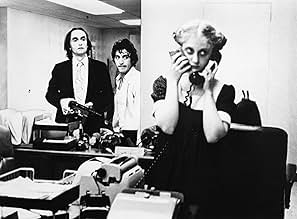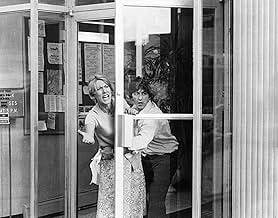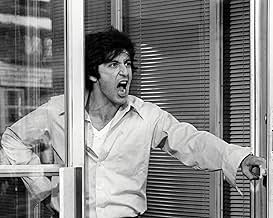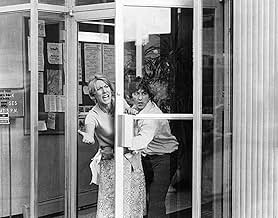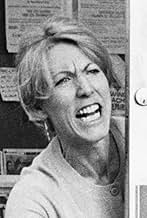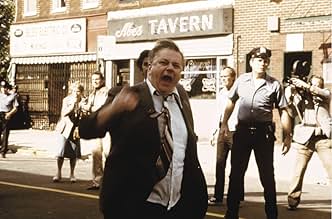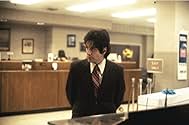Three amateur robbers plan to hold up a Brooklyn bank. A nice, simple robbery: Walk in, take the money, and run. Unfortunately, the supposedly uncomplicated heist suddenly becomes a bizarre ... Read allThree amateur robbers plan to hold up a Brooklyn bank. A nice, simple robbery: Walk in, take the money, and run. Unfortunately, the supposedly uncomplicated heist suddenly becomes a bizarre nightmare as everything that could go wrong does.Three amateur robbers plan to hold up a Brooklyn bank. A nice, simple robbery: Walk in, take the money, and run. Unfortunately, the supposedly uncomplicated heist suddenly becomes a bizarre nightmare as everything that could go wrong does.
- Director
- Writers
- Stars
- Won 1 Oscar
- 14 wins & 20 nominations total
- Director
- Writers
- All cast & crew
- Production, box office & more at IMDbPro
Summary
Reviewers say 'Dog Day Afternoon' is celebrated for Al Pacino's compelling performance and Sidney Lumet's direction. It explores themes like crime, media influence, and social issues. The film is praised for its realistic depiction, strong characters, and blend of drama and humor. However, some find it overly long and uneven. Despite mixed opinions on pacing and length, it is generally regarded as a significant work in American cinema, capturing the 1970s spirit.
Featured reviews
The late John Wojtowicz whose mad exploit on one afternoon in Brooklyn probably never dreamed his life would result in an awarded picture. But I suppose the Oscar that Frank Pierson won for Best Original Screenplay kind of verified his time on earth. Not to mention the five other Oscar categories Dog Day Afternoon was nominated in, Best Picture, Best Film Editing, Best Director for Sidney Lumet, Best Actor for Al Pacino and Best Supporting Actor for Chris Sarandon.
It all happened to be sure on Avenue P in Brooklyn, the location that the film was shot on 10th Street was not where it happened, just the same borough. But the film sure comes close to graphically illustrating the bizarre carnival of events that happened in the summer of 1972.
Al Pacino playing Sonny Wojcik is a gay man who has left his wife and kids and is now living with a man who has confessed to him he's a transgender individual and the doctors have recommended a sex change for him. The sexually confused Pacino and at that time he was hits on this mad move to rob a bank to get enough money for sexual reassignment. At that time the cost they're talking about is $2500.00 which now wouldn't pay for the scrub nurse. Then as now medical insurance companies won't cover it.
So Pacino goes in with buddies John Cazale and Gary Springer and pulls a robbery at closing time at a Brooklyn bank. They're supposed to be in and out, but these guys aren't professional criminals. One thing leads to another and law enforcement has Pacino and Cazale trapped, Springer having opted out of the crime real early.
Then the media freak show begins, at first with crowd actually on Pacino's side as he gives lip to the law. Then when they find out what is the underlying motive for the robbery, good old homophobia takes over. The cheers turn to jeers when Pacino comes out in the street for the police and the cameras.
Dog Day Afternoon is a key film for the gay/lesbian/bisexual/transgender community in the USA. It's one of the first that explores a gamut of issues like the closet, internalized homophobia, being forced into marriage for convention's sake, even same gender marriage. It's exploitive to be sure, but does have its tender moments as well. The highlight of the film for me is the phone conversation with Pacino and Sarandon who had no idea what Pacino had in mind. Sarandon gave one of the first performances of a transgender person in a major motion picture.
John Wojtowicz, Sonny Wojcik for the film did a stretch in the federal pen for the bank robbery and after he was released I met him. By the time we met, both of us were comfortable in our sexuality, I was most closeted when this incident happened. When we met it was the late Eighties. If I was comfortable, John Wojtowicz was positively reveling in it.
Dog as he was then known because of the film was a character in the Greenwich Village bar scene where I met him. Dog used his celebrity, notoriety if you prefer, to get himself a fabulous share of rent boys whom he paid nominal monies for services. He carried ever ready copy of faded clippings from the crime and some of those dumb kids actually thought of him as something special. As a character Dog certainly was.
When I moved out of New York I didn't see Dog around any more and he died a few years ago. The man had his fifteen minutes of celebrity and worked it to the max. This review is dedicated to John Wojtowicz as one unforgettable individual.
It all happened to be sure on Avenue P in Brooklyn, the location that the film was shot on 10th Street was not where it happened, just the same borough. But the film sure comes close to graphically illustrating the bizarre carnival of events that happened in the summer of 1972.
Al Pacino playing Sonny Wojcik is a gay man who has left his wife and kids and is now living with a man who has confessed to him he's a transgender individual and the doctors have recommended a sex change for him. The sexually confused Pacino and at that time he was hits on this mad move to rob a bank to get enough money for sexual reassignment. At that time the cost they're talking about is $2500.00 which now wouldn't pay for the scrub nurse. Then as now medical insurance companies won't cover it.
So Pacino goes in with buddies John Cazale and Gary Springer and pulls a robbery at closing time at a Brooklyn bank. They're supposed to be in and out, but these guys aren't professional criminals. One thing leads to another and law enforcement has Pacino and Cazale trapped, Springer having opted out of the crime real early.
Then the media freak show begins, at first with crowd actually on Pacino's side as he gives lip to the law. Then when they find out what is the underlying motive for the robbery, good old homophobia takes over. The cheers turn to jeers when Pacino comes out in the street for the police and the cameras.
Dog Day Afternoon is a key film for the gay/lesbian/bisexual/transgender community in the USA. It's one of the first that explores a gamut of issues like the closet, internalized homophobia, being forced into marriage for convention's sake, even same gender marriage. It's exploitive to be sure, but does have its tender moments as well. The highlight of the film for me is the phone conversation with Pacino and Sarandon who had no idea what Pacino had in mind. Sarandon gave one of the first performances of a transgender person in a major motion picture.
John Wojtowicz, Sonny Wojcik for the film did a stretch in the federal pen for the bank robbery and after he was released I met him. By the time we met, both of us were comfortable in our sexuality, I was most closeted when this incident happened. When we met it was the late Eighties. If I was comfortable, John Wojtowicz was positively reveling in it.
Dog as he was then known because of the film was a character in the Greenwich Village bar scene where I met him. Dog used his celebrity, notoriety if you prefer, to get himself a fabulous share of rent boys whom he paid nominal monies for services. He carried ever ready copy of faded clippings from the crime and some of those dumb kids actually thought of him as something special. As a character Dog certainly was.
When I moved out of New York I didn't see Dog around any more and he died a few years ago. The man had his fifteen minutes of celebrity and worked it to the max. This review is dedicated to John Wojtowicz as one unforgettable individual.
Brooklyn, New York. Sonny, Sal and another man walk into the bank and hold it up. Seconds into the job, the third man changes his mind and leaves. The job starts to go wrong when Sonny discovers that the truck he was told was dropping off money, was actually picking it up, meaning the vault is nearly empty. Things get worse when the police arrive outside and trap the two inside with a handful of hostages. As Sonny and Sal try to keep control, a circus breaks out on the street with the police, the public and the media all involved.
I have seen this film several times but it has been a few years since I last had the chance to see it. I watched it again today with the memory of it being good but not really as truly great as many seem to think it is. The plot is all the more fascinated for it being true but it is not an easy subject to bring to the screen. While morally most people can accept robbers in films as characters to support, it is a bigger step to accept the sexualities and complexities of these characters and to get behind them. However the film actually manages to make this quite moving and difficult - not only do we feel for Sonny but the film is fair to him and, more impressively, Leon. It would have been easy to turn this relationship into a joke but the script allows it to be done with sensitivity. The rest of the film captures the sense of circus and media feeding frenzy well as well as being quite tense and enjoyable to watch.
The film's strength is it's performances and, in particular, Pacino in a performance that is both showy and understated at different times. He is a real person and it is to his credit that, no matter the revelations about Sonny, he never loses the audience. Cazale is good here too but in a different way - a simple, sympathetic character. His hit rate is amazing when you think that he was only ever in a handful of films and they were all pretty amazing, but it's hard to tell how good an actor he was really. Durning is good in support and the rest of the cast are pretty good but it is Pacino's film and he manages well with the shouting, the silence and the complexities of his characters.
Overall this is not one of the best films ever made but it is certainly a very good telling of this true story. The film deals very well with both the tension of the situation but also the underlying stories and characters - even more surprising for the period it was made in, it makes a very balanced presentation of the homosexual characters. The direction is very good and the performances are all good, but it is Pacino's film and he does very well with it.
I have seen this film several times but it has been a few years since I last had the chance to see it. I watched it again today with the memory of it being good but not really as truly great as many seem to think it is. The plot is all the more fascinated for it being true but it is not an easy subject to bring to the screen. While morally most people can accept robbers in films as characters to support, it is a bigger step to accept the sexualities and complexities of these characters and to get behind them. However the film actually manages to make this quite moving and difficult - not only do we feel for Sonny but the film is fair to him and, more impressively, Leon. It would have been easy to turn this relationship into a joke but the script allows it to be done with sensitivity. The rest of the film captures the sense of circus and media feeding frenzy well as well as being quite tense and enjoyable to watch.
The film's strength is it's performances and, in particular, Pacino in a performance that is both showy and understated at different times. He is a real person and it is to his credit that, no matter the revelations about Sonny, he never loses the audience. Cazale is good here too but in a different way - a simple, sympathetic character. His hit rate is amazing when you think that he was only ever in a handful of films and they were all pretty amazing, but it's hard to tell how good an actor he was really. Durning is good in support and the rest of the cast are pretty good but it is Pacino's film and he manages well with the shouting, the silence and the complexities of his characters.
Overall this is not one of the best films ever made but it is certainly a very good telling of this true story. The film deals very well with both the tension of the situation but also the underlying stories and characters - even more surprising for the period it was made in, it makes a very balanced presentation of the homosexual characters. The direction is very good and the performances are all good, but it is Pacino's film and he does very well with it.
By the time Sidney Lumet's "Dog Day Afternoon" came around he had already learned to let Al Pacino loose. Forget the holdbacks of "Serpico"; here we get a glimpse into the real Al, the actor who would bring Tony Montana to life in the years to come and the same man who provided Michael Corleone with such heartfelt warmth that was lacking in some of his lesser characters.
There's essentially the Al Pacino as an actor and the Al Pacino as a character, and here he's the character, and it works splendidly. Al Pacino the actor comes into play when he is given a recycled script and a talentless director, which has been happening a lot lately, although fortunately his comparison, De Niro, has been lucky enough to generally avoid these blunders of older-age film-making.
This is based on a true story, like "Serpico," only it's better and more involving. It connects with the audience more than "Serpico" because it doesn't jump through the same old hoops; it goes for the long trek and comes off better than it would have had the team behind it been lazy. The clichés are gone and the originality creeps in early on. Watch Pacino indulge himself in character and let the plot sink in. It's more touching than it seems at first.
Pacino is Sonny Wortzik, a Brooklyn man who takes a bank hostage in order to pay for his "wife's" operation. The wife is actually Leon Shermer (Chris Sarandon who was Oscar-nominated for this, his first role in a mainstream film), Sonny's gay lover who doesn't have the money for a sex operation.
The bank robbery was going to be what one of classic cinema's greatest bad guys once described as a quick "in and out," but Sonny gets held up inside the bank and soon he's all over the news and police are standing outside the building with guns drawn. It's like Denzel's movie only better and more original. Oh, and true. This one actually happened and we can tell.
Sonny's partner in crime, Sal (John Cazale), is worried that he'll be treated as a homosexual by the media outside. His fretting is comic relief and one of the connections between the film and the audience. Charles Durning is the frustrated cop handling the situation. His performance is as subtly convincing as Cavale's.
Pacino's performance is exceedingly excellent, manic and energetic. He'd display this same talent in "Scarface" again eight years later; only he would be bashed by the critics for going over-the-top. (Although they really just had problems with the excessive profanity and violence, just like Mel Gibson's "The Passion of the Christ" will soon become a well-known classic and people will laugh when they hear that someone once called it the most violent film ever made.)
There's also one of the best scenes of all time in this movie that rivals Montana's Last Stand in "Scarface" or the Baptism Scene in "The Godfather," which involves Sonny speaking on the phone to his "wife," carefully concealing his motive from any listeners nearby. Watch Pacino delve into character here and you're immediately hooked. We like his character because he seems real and Pacino makes him real, and that's why this will go down as one of the best tour de force performances of all time.
Is this Hollywood trying to ease our culture onto homosexuality and sex change operations? Is Hollywood trying to gradually introduce us to gay characters in the hope that the uptight American families will be increasingly invaded by the images of gay men? No. This is Hollywood showing us a true story, regardless of the homosexuality. Pacino could be playing a frustrated postal worker and it would still work because it all settles down to the fact that the suspense and dramatics of the movie affect us, not the background of its characters.
Sarandon's Oscar nomination was more than worthy; here he displays the smarmy talent that would shine through in his characters in the years to come. Prince Humperdink from "The Princess Bride" is equally memorable but less realistic. Here he seems more real, which is good for this film and would have been quite bad for "Bride." We don't like real characters in fantasy tales, do we?
Lumet, who ruined "Serpico" with his bad editing, out-of-place music, clichéd dialogue/events and unnecessary scenes, directs "Dog Day Afternoon" with style and flair and good pacing and a surprisingly heartfelt sense of emotion and care. This isn't exactly a good example of a perfect motion picture but it's pretty close.
There's essentially the Al Pacino as an actor and the Al Pacino as a character, and here he's the character, and it works splendidly. Al Pacino the actor comes into play when he is given a recycled script and a talentless director, which has been happening a lot lately, although fortunately his comparison, De Niro, has been lucky enough to generally avoid these blunders of older-age film-making.
This is based on a true story, like "Serpico," only it's better and more involving. It connects with the audience more than "Serpico" because it doesn't jump through the same old hoops; it goes for the long trek and comes off better than it would have had the team behind it been lazy. The clichés are gone and the originality creeps in early on. Watch Pacino indulge himself in character and let the plot sink in. It's more touching than it seems at first.
Pacino is Sonny Wortzik, a Brooklyn man who takes a bank hostage in order to pay for his "wife's" operation. The wife is actually Leon Shermer (Chris Sarandon who was Oscar-nominated for this, his first role in a mainstream film), Sonny's gay lover who doesn't have the money for a sex operation.
The bank robbery was going to be what one of classic cinema's greatest bad guys once described as a quick "in and out," but Sonny gets held up inside the bank and soon he's all over the news and police are standing outside the building with guns drawn. It's like Denzel's movie only better and more original. Oh, and true. This one actually happened and we can tell.
Sonny's partner in crime, Sal (John Cazale), is worried that he'll be treated as a homosexual by the media outside. His fretting is comic relief and one of the connections between the film and the audience. Charles Durning is the frustrated cop handling the situation. His performance is as subtly convincing as Cavale's.
Pacino's performance is exceedingly excellent, manic and energetic. He'd display this same talent in "Scarface" again eight years later; only he would be bashed by the critics for going over-the-top. (Although they really just had problems with the excessive profanity and violence, just like Mel Gibson's "The Passion of the Christ" will soon become a well-known classic and people will laugh when they hear that someone once called it the most violent film ever made.)
There's also one of the best scenes of all time in this movie that rivals Montana's Last Stand in "Scarface" or the Baptism Scene in "The Godfather," which involves Sonny speaking on the phone to his "wife," carefully concealing his motive from any listeners nearby. Watch Pacino delve into character here and you're immediately hooked. We like his character because he seems real and Pacino makes him real, and that's why this will go down as one of the best tour de force performances of all time.
Is this Hollywood trying to ease our culture onto homosexuality and sex change operations? Is Hollywood trying to gradually introduce us to gay characters in the hope that the uptight American families will be increasingly invaded by the images of gay men? No. This is Hollywood showing us a true story, regardless of the homosexuality. Pacino could be playing a frustrated postal worker and it would still work because it all settles down to the fact that the suspense and dramatics of the movie affect us, not the background of its characters.
Sarandon's Oscar nomination was more than worthy; here he displays the smarmy talent that would shine through in his characters in the years to come. Prince Humperdink from "The Princess Bride" is equally memorable but less realistic. Here he seems more real, which is good for this film and would have been quite bad for "Bride." We don't like real characters in fantasy tales, do we?
Lumet, who ruined "Serpico" with his bad editing, out-of-place music, clichéd dialogue/events and unnecessary scenes, directs "Dog Day Afternoon" with style and flair and good pacing and a surprisingly heartfelt sense of emotion and care. This isn't exactly a good example of a perfect motion picture but it's pretty close.
... which it does, in buckets. Founded on a very interesting true story, embellished by Al Pacino who turns it into gold, albeit not in the quantities his character would have hoped for. With a stonking supporting cast, non better than John Cazale, you'll be drawn into the events presented as if you were there on the day, or afternoon, and quite probably investigate further as the titles start to role. Without question one of the best films of the 70s and one of few that retains its progressive and powerful impact all these years later.
A brilliant movie, and a mesmerizing Al Pacino. If u thought he was spectacular in GF I, II, and Scarface....then just watch him in Dog Day Afternoon. Quite simply one of the greatest performances in movie history. Definitely my favorite. The depth with which he plays Sonny is such a treat to watch that I lost count of how many times he left me in AWE. There's this indescribable nervous energy to his performance that there's no way he'll leave u NOT feeling sorry for Sonny.
Sadly, for some reason this movie is kinda forgotten when discussing Al's greatest movies/performances. That's because not many people have watched it. So please, if u consider yourself a movie fan, then go rent DDA and watch a fine movie with the legendary Al Pacino performing his art at the absolute peak of his career.
Sadly, for some reason this movie is kinda forgotten when discussing Al's greatest movies/performances. That's because not many people have watched it. So please, if u consider yourself a movie fan, then go rent DDA and watch a fine movie with the legendary Al Pacino performing his art at the absolute peak of his career.
Did you know
- TriviaAlthough he had initially agreed to play the part of Sonny, Al Pacino told Sidney Lumet near the start of production that he couldn't play it. Pacino had just completed production on Le Parrain, 2ᵉ partie (1974) and was physically exhausted and depressed after the shoot. With his reliance on the Method, Pacino didn't relish the thought of working himself up to a state of near hysteria every day. Lumet unhappily accepted the actor's decision and dispatched the script to Dustin Hoffman. Pacino reportedly changed his mind when he heard that his rival was being considered for the role.
- GoofsIn 1972, NYC police squad cars were dark green and white, not blue and white which debuted about two years later.
- Crazy creditsOpening credits prologue: What you are about to see is true - It happened in Brooklyn, New York on August 22, 1972.
- Alternate versionsThe 1997 DVD contained the opening 1984 Warner Bros. Pictures plaster and no closing logo.
- ConnectionsFeatured in Lumet: Film Maker (1975)
Details
- Release date
- Country of origin
- Official sites
- Language
- Also known as
- Tarde de perros
- Filming locations
- Production companies
- See more company credits at IMDbPro
Box office
- Budget
- $1,800,000 (estimated)
- Gross US & Canada
- $50,000,000
- Gross worldwide
- $50,005,703
Contribute to this page
Suggest an edit or add missing content





